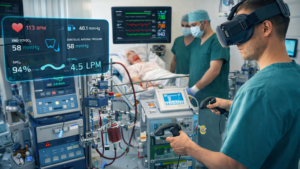Objectives: Previous studies have described impaired platelet function after cardiopulmonary bypass (CPB). Whether this is still valid in contemporary cardiac surgery is unclear. This study aimed to quantify changes in function and number of platelets during CPB in a present-day cardiac surgery cohort.
Design: Prospective, controlled clinical study.
Setting: A single-center university hospital.
Participants: Thirty-nine patients scheduled for coronary artery bypass graft surgery with CPB.
Interventions: Platelet function and numbers were measured at 6 timepoints in 39 patients during and after coronary artery bypass graft surgery; at baseline before anesthesia, at the end of CPB, after protamine administration, at intensive care unit (ICU) arrival, 3 hours after ICU arrival, and on the morning after surgery.
Measurements and main results: Platelet function was assessed with impedance aggregometry and flow cytometry. Platelet numbers are expressed as actual concentration and as numbers corrected for dilution using hemoglobin as a reference marker. There was no consistent impairment of platelet function during CPB with either impedance aggregometry or flow cytometry. After protamine administration, a decrease in platelet function was seen with impedance aggregometry and for some markers of activation with flow cytometry. Platelet function was restored 3 hours after arrival in the ICU. During CPB (85.0 ± 21 min), the number of circulating platelets corrected for dilution increased from 1.73 ± 0.42 × 109/g to 1.91 ± 0.51 × 109/g (p < 0.001).
Conclusions: During cardiac surgery with moderate CPB times, platelet function was not impaired, and no consumption of circulating platelets could be detected. Administration of protamine transiently affected platelet function.
Keywords: cardiac surgery; cardiopulmonary bypass; flow cytometry; impedance aggegometry; platelet function; protamine.







